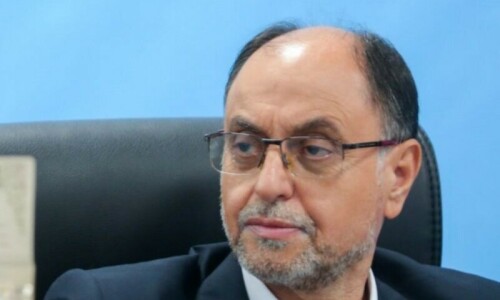KARACHI, Aug 27: Underlining the need for linking community midwives programme with the district health management system and provision of quality training to community midwives, speakers at a seminar held here on Tuesday said that though small gains had been made, many remote areas in the province were still without support of lady health workers and trained midwives.
These areas, they said, were those where literacy rate was too low and unless the government made a concerted effort to ensure provision of education in these areas, the desire of achieving the millennium development goals (MDGs) pertaining to infant and maternal health would remain a distant dream.
The seminar titled ‘Community midwives — handling motherhood with care’ was organised by the Sindh government’s Maternal, Neonatal and Child Health (MNCH) programme in collaboration with the Pakistan Nursing Council, Technical Resource Facility (TRF) and Research and Advocacy Fund (RAF).
Giving a presentation on the status of community midwives in Sindh, MNCH provincial programme director Dr Sahib Jan Bader said that the initiative of community midwives was the backbone of the programme and the government’s aim was to reduce maternal and infant mortality rate — currently the highest in the region.
The national MNCH programme, she said, had six main components under PC-1. One of them was about community-based skilled birth attendants called community midwives (CMWs). Their 18-month training course was initiated in 2008 in Sindh.
So far, 1,417 women have been trained in this respect against the target of 1,960. Of them, 1,365 CMWs are working in the field and performing deliveries at their homes where they set up a birth station, according to her.
A midwife, she said, was being trained to attain ability to perform delivery individually, promote health awareness, identify danger signs during delivery, provide antenatal care and family planning counselling and maintain a database at her work station, among other things.
“A community midwife is trained and licensed to provide medical care during normal pregnancy, labour and delivery to the mother and baby,” she informed the audience.
In reply to a question on the programme’s funding, she said: “Funds are being provided by the provincial government and a UK-based organisation, the Department For International Development (DFID). The annual funding in this programme has reduced from Rs300 million to Rs219 million on account of devolution but we are keeping our fingers crossed as the government has promised to provide us with the required funds in a few months.”
Answering another question, she said midwives were provided with a comprehensive kit, which included disinfectants, in order to check diseases like hepatitis.
The government has opened 12 new schools of midwifery while renovation of at least seven existing schools is under way. The government is spending Rs200,000 on the training of each midwife who receives Rs3,500 as stipend during the training. As they started working, the amount was reduced to Rs2,000, she said.
Highlighting challenges, she said that a major problem was to find candidates from rural areas for training. Besides, there was a desperate need for attaching midwifery schools with district and tehsil headquarter hospitals for clinical training, besides strengthening referral linkages.
Handicaps and setbacks
Giving a presentation on behalf of PNC registrar Nighat Durrani, who could not make it to the event, Dr Najma Lalji, a public health practitioner associated with the TRF, said that inadequate practical training was a big handicap for midwives as was evident from a survey that showed that 54 per cent midwives conducted less than 10 deliveries during their training while 16 per cent midwives did not perform any delivery at hospital.
“They found it difficult to apply their theoretical knowledge at a particular situation. One hopes that the situation has improved now as their training material has been revised,” she said, adding that efforts to improve community midwifery training programme was a joint activity of the MNCH programme, PNC and TRF.
Other handicaps identified in the midwifery programme included a lack of implementation of the selection criteria, inadequate infrastructure for the training, supplies and equipment, a lack of coordination between community midwifery school and clinical facility and shortage of trainers.
Dr Zahid Memon, representing RAF, said that global experiences indicated that one way of bringing about an improvement in the maternal and infant health situation was a proficient frontline of skilled midwives, along with supportive supervision and strong linkages with the referral system.
He shared findings of a research on community midwives and suggested that selected women must be from the areas most in need. It was also necessary to ensure that the midwives acquired a high standard of skills based on appropriate practical experience as well as good communication skills.
“The programme needs to ensure a highly motivated workforce and this can be achieved by resolving issues of procedural delays,” he said.
Some community midwives also spoke about the challenges that they had faced during their training and practice.
Health secretary Inamullah Dharejo and director-general Dr Ashfaq Hussain Memon, Begum Shehnaz Wazir Ali and MPA Syed Nasir Shah also spoke.












































Dear visitor, the comments section is undergoing an overhaul and will return soon.